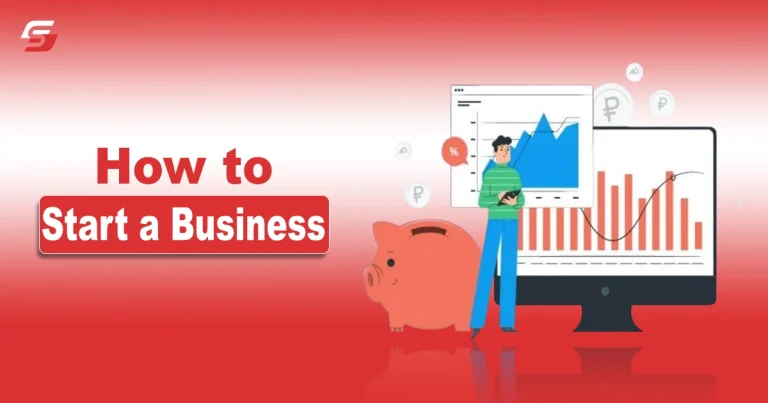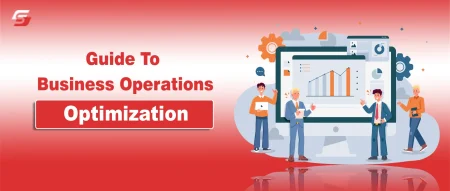Looking forward to starting a business but not aware of the point to begin? Well, this is the area where most people get troubled as it requires a lot of consideration and research. However, there is no need to worry as I am here with this detailed guide on how to start a business.
Based on your approach, it can be a daunting as well as a deteriorating experience. Therefore, it is necessary to clear up your mind and set goals so you can pave the way to achieve them. To help you in this regard, I have created this article and provided you with step by step details. Plus, I have also shared some best business ideas you can consider when starting a new business.
Make sure to understand and follow them in an accurate fashion to get into the market with the right mindset and achieve the desired level of success.
Essential Business Stats
Before starting a new business, you should check out these business stats for inspiration:
- A self-employed business owner typically makes $44,000/year.
- There are 33.2 million small businesses in the US.
- Small businesses contributed to 17.3 m new jobs created in the last 26 years.
- The costs of starting a business were between $250,000 to $500,000 for most entrepreneurs.
- 28% of people started a small business to be their own boss.
How to Start a Business – 10 Steps
Here are the following steps to start your own business.
1 – Refine Your Business Idea
Before you start a business, you need to focus and understand what business you are going to start. If you already have an idea in mind, then you must determine whether you are good at it and whether it is profitable. You can ask some questions yourself, such as,
- What is your expertise?
- Who will be your target audience?
- What is the demand for the products you are going to launch?
- How much time are you going to spend?
- Do you have resources that make your business profitable?
- Do you want to work from home or in an office?
These questions help you make smart decisions before you start the business. However, if you do not have an idea and are just thinking of starting your own business, these questions will also help you find the best ideas for the best business.
If you are not sure what kind of business to start? here are some profitable business ideas to start:
Online Business Ideas:
- Start a Blog
- Launch Dropshipping Business
- Start an E-commerce Store
- Start a Clothing Business
- Start a Business Consulting Firm
Physical Business Ideas:
- Start Soap Making Company
- Used Furniture Wholesale Business
- Open a Franchise
- Property Management Business
- Healthcare Courier Service
2 – Write a Business Plan
A business plan is base of your business. It serves as a roadmap for how to establish, run, and boost it. Further, it helps in convincing the people who work with you, like investors and financial management companies. You need to clearly mention your products, services, money-making strategies, and who you need to work with you.
You should also include:
- Executive summary that provides an overview of your business.
- Detailed description of your business, its mission, and vision.
- Market analysis, including information about your target audience and competition.
- Information about your business’s organizational structure and management team.
- Sales and marketing strategies.
- Financial projections and a budget.
- Funding requirements, if applicable.
3 – Business Legal Structure
The right legal structure for your business is an important decision that affects your liability, taxes, and operational flexibility. Whether you want to start an affiliate marketing business or a manufacturing company, you should choose an appropriate legal structure.
Common legal structures include:
1. Limited Liability Company (LLC):
An LLC, or Limited Liability Company, combines the pass-through taxation of a partnership or sole proprietorship with the limited liability of a corporation. Owners are not personally liable for the debts and obligations of the LLC, and it protects their personal assets.
2. Limited Liability Partnership (LLP):
A Limited Liability Partnership is a partnership-based legal structure for licensed business professionals, such as accountants and attorneys. However, Partners are not personally liable for the debts and liabilities of the LLP beyond their investment. LLP partners can define their roles and responsibilities with a partnership agreement, which offers flexibility in management and operations.
3. Sole Proprietorship:
Sole Proprietorship owner has unlimited liability, which means they are personally responsible for all debts and obligations of the business. They have complete control of all business operations and decision-making.

4 – Fund Your Business
As a beginner, you need funding and a budget to run a business. There are several choices for funding. You can fully fund your business by yourself, or you can consider other options like investing in your business with friends or family. Business experts divided business funding into two categories: Internal funding and External funding.
Internal funding means:
- Personal savings
- Credit cards
- Family or friends’ investment
On the other hand, most business owners seek external funding for startups. But it needs to consider some factors like how much money you need, when you will be able to repay, and how much you expect to earn profit from. Keep all these factors in mind when acquiring external funding for your business.
External funding means:
- Small business grants
- Small business loans
- Crowdfunding
- Angel investors
- Venture Capitals
5 – Business Compliance and Registration
After finalizing the structure of your business, it’s time to legalize your business. You need to register your business with your state and federal government. All you need is to choose a registered agent complete the process of documents, and get your legal certificate and Federal Tax ID. For this legal documentation and certification, you need to pay a fee to the government and agent.
Key considerations for the legal process include:
- Verify that you possess the licenses and permits required to conduct business lawfully.
- Recognize and abide by income tax, sales tax, and other tax requirements.
- Respect labor laws, employee rights, and employment legislation.
- If relevant, ensure your company’s operations abide by sustainability guidelines and environmental legislation.
6 – Choose a Location and Equipment
No matter whether you have to start a physical business or an online store, you will need a physical place for staff management. Your business location will affect the legal requirements, revenue, and taxes. So, you need to make a smart decision about your office location.
Consider your business expenses and compare them with your estimated profit, which will give insights into choosing a location accordingly. If you are going to start a small business or inventory management then you can consider running business from home.
Here is what you need to consider when choosing a business location:
- Choose a location that aligns with your target market and budget. Consider factors like visibility, accessibility, and proximity to suppliers and customers.
- Purchase the necessary tools, machinery, and office supplies.
- Invest in the right software and hardware for your operations, such as computers, point-of-sale systems, or inventory management software.
7 – Hiring Employee
As your business grows, you need a team to handle business tasks and operations. In this regard, you need to hire talented employees who will help you grow your business and run operations smoothly. AI and recruitment tools can help you identify the right candidates faster by screening resumes, analyzing skills, and even predicting job fit. You should also conduct Procurement Training programs after hiring employees for better efficiency.
You can recruit the employees through different sources:
- Hiring Platforms: You can hire and recruit talented employees via hiring platforms such as Glassdoor or Indeed, which allow you to post your job description.
- Freelance Platforms: There are several freelancing platforms where freelancers offer their services to businesses, and you can hire the talented one on a permanent basis as a remote worker or physical office-based. You can also hire hourly staff on such platforms.
- Job Boards: Alternatively, you can post your hiring jobs on Job boards like Craiglist to find the right people.

8 – Branding and Marketing the Business
Marketing is one of the most effective elements for a business to grow and stand out in the competition. If you have spent a lot of money on establishing a business and creating products but do not set a budget for marketing, it means slow business growth.
it is equally important to promote products or services online to reach a larger audience and grow the business.
Here is how you can market your business:
- Create a Website: If you are starting a local business or online store, a business website is helpful to promote your services or products through relevant content. You can create an e-commerce store for your products.
- SEO: After creating a website, optimize your site for search engines (SEO). In this way, you can rank first when your customers search for your specific products.
- List Your Business on Local Directories: Most people find nearby businesses through Google My Business, Yelp, and Facebook. So, you can list your business on Google My Business and other local directories to appear in local search results.
- Create a Social Media Strategy: You can attract a large customer base from social media platforms due to a large user base. Create a social media strategy to drive customers to your site where they can learn about your products or services. You can also check out these Facebook Marketing Tips for New Businesses to promote your online business.
- Brand Logo: Create a brand logo that represents your company and use it all across your online marketing, penaflex, visiting cards, and products.
9 – Apply for Business Insurance
Insurance is another important factor to keep in mind when you are starting a business because it protects against business loss, office damage, or any personal injury. It gives peace of mind that you can cover the cost of loss if, unfortunately, you face any loss in business.
There are various types of business insurance, and what type of insurance you need depends on your business model and the risks you want to cover. However, consulting with an insurance agent gives you an idea of which kind of coverage is best for your business.
Here are the types of business insurance coverage:
- Liability insurance: it is a type of insurance that protects property damage, personal injury, and third-person bodily injury.
- Property insurance: This type of insurance covers the cost of physical office space, inventory, and equipment.
- Business interruption insurance: In case your business is lost due to natural disasters, this coverage type protects you from loss.
- Product liability insurance: The coverage of property damage and bodily injured products.
- Workers’ compensation insurance: It protects and covers the injuries and medical expenses of employees who are injured on the job.
10 – Monitor Ongoing Management and Growth
Finally, when everything is set to and you have successfully launched the business, monitor ongoing management to grow more your business. Be consistent, follow a path, analyze the market, and adopt flexibility, time management, and entrepreneurship skills for success.
Regularly check your business operations, clients review, and reports from employees to know where you need to improve the business.
Your employment is far from done once your business is operating. To guarantee sustained prosperity and expansion, you need to:
- Keep a close eye on your finances and make any required modifications to stay on course.
- Get input from clients and make necessary adjustments to better you’re offering.
- Investigate chances for growth, diversification, or the launch of new goods or services in response to changing consumer needs.
- To keep and expand your client base, make continuous marketing and customer engagement investments.
- Keep up with market and industry developments to stay competitive and adjust to changes in the business environment.
Up to You
Starting a business can be a frustrating process as there are a lot of factors you have to keep in mind while doing so. Some of the major factors include refining your idea, planning, branding, marketing, etc. If you don’t perform these things with care, chances are you will have difficulty starting your business.
In the information that we have given above, you can find some important factors that you have to keep in mind while starting a business. Additionally, consulting with business consultants is another way to seek help and recommendations according to your expertise and budget.









